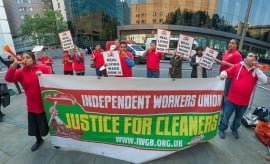Last week, workers at the University of London (UoL) submitted a claim to the European Court of Human Rights in Strasbourg over UK trade union legislation. The workers, university cleaners at UoL, are represented by the Independent Workers’ Union of Great Britain (IWGB) and are seeking official recognition of the union by their employer.
Last week, workers at the University of London (UoL) submitted a claim to the European Court of Human Rights in Strasbourg over UK trade union legislation.
The workers – university cleaners who are represented by the Independent Workers’ Union of Great Britain (IWGB) – argue that provisions in the Trade Union and Labour Relations (Consolidation) Act of 1992, which have the effect of preventing their union from obtaining statutory recognition despite its high level of membership at UoL, represent a breach of their right to freedom of association under the European Convention on Human Rights.
Formed in August 2012, the IWGB represents largely migrant workers who tend to be underrepresented and overexploited in the workplace.
The workers’ claim forms part of an ongoing struggle for union recognition, which is being resisted by Cofely, their employers. The IWGB currently represents over 60% of Cofely employees at UoL but has been consistently excluded from negotiations over pay and working conditions. When the IWGB has sought statutory recognition it has been legally blocked because Cofely has voluntarily recognised another union, Unison, which represents probably not more than 5-10% of the Cofely employees at UoL.
UK legislation currently provides no means of compelling Cofely either to recognise IWGB in addition to or instead of Unison, leaving the majority of UoL cleaners out in the cold – yet another example of restrictive union legislation being used as a trump card by employers to deny collective bargaining rights to their workers.
We spoke to the President of the IWGB, Jason Moyer-Lee, who told us that with recognition the IWGB would be able to negotiate and improve procedures and conditions across the board, rather than having to fight individual cases as they arise.
Despite being shunned by employers, the IWGB has waged successful struggles for the London Living Wage (£9.40/hour) for staff at the Royal College of Music and the Royal College of Art – an important step forward which the union intends to defend and build upon in future.
As for the Tories’ proposed “Living Wage” which will come into force in April 2016, Jason said that it will be a big improvement on the current minimum wage, which will likely affect much of the IWGB’s membership. However, he stressed that what the government was introducing was not a ‘Living Wage’ but rather a re-branded increase on the minimum wage. He fears that this is “undermining the concept of the Living Wage”. Further, IWGB members who currently work on a ‘self-employed’ basis (such as couriers) will not benefit from the proposed changes.
Another looming obstacle is the government’s reactionary Trade Union Bill, which even a Tory MP, David Davis, has compared to “Franco’s Spain”. According to Jason, the most potentially harmful provision from the IWGB’s perspective relates to social media. He fears that the obligation to inform the police what you’re going to post in advance will hurt small unions with limited resources even harder. However, he is hopeful that a Corbyn-led Labour Party in opposition may be able to limit the damaging effects of the bill.
As for next steps, the IWGB is currently based entirely in London so for Jason the top priority is to build up the union’s resources so it can grow into other industries and parts of the country.
Socialist Appeal wishes the IWGB cleaners solidarity in their fight for recognition and the best of luck in their future struggles!






